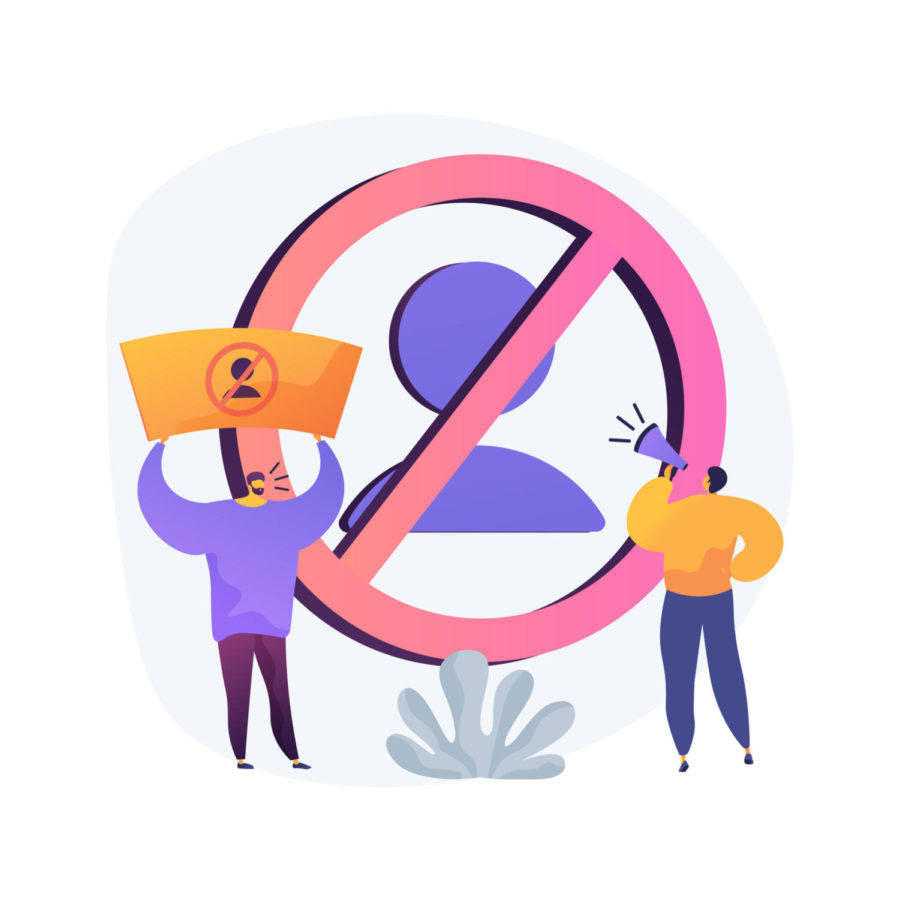Cancel culture has gone too far
One person holds a sign and another holds a megaphone. They both stand next to an image with the “no” symbol surrounding an unidentified figure, supporting their cancellation.
March 17, 2021
Every day it seems there is a new person that has been “canceled” and cast out of social or professional circles either online or in person; however, cancel culture has become too broad recently, and it is being misused to cancel people who do not deserve to be.
“The term ‘canceled’ has gotten away from what it originally meant,” journalism professor Bill Cassidy said. “Initially ‘cancel’ several years ago just meant ‘I am not dealing with you; I am not supporting you.’”
This is obviously very different from what we know as canceling today. Whereas it originally was just ignoring people who had different views than your own, it has morphed into people actively attempting, and many times exceeding, to ruin someone’s life. It has drawn inspiration from boycotting, according to the University of Central Florida, which has a long history of being a powerful political and social tool. There are many instances of people getting canceled for very good reasons. But the term has lost its meaning, and cancellation fails to target people who deserve to be canceled in the modern way.
Many have been canceled and ostracised due to sexual and predatory behavior, and these people deserve nothing less than to be thrown in jail and forgotten by society, however, cancel culture has gotten to the point where many people are getting canceled over jokes they made years ago or remarks that have painted them in a certain light that have been proven untrue. These people do not deserve to be fired from their jobs and have their lives ruined over things so trivial.
Eminem is currently being canceled on TikTok due to some of his past lyrics. The specific lyric that is causing controversy comes from his 2010 collaboration with Rihanna “Love The Way You Lie,” according to Radio X. The lyrics, “If she ever tries to f***ing leave again, I’ma tie her/to the bed and set this house on fire,” are certainly off-color, but there is a big difference between writing out words in a song and actually partaking in the act. He is being treated like he is actually partaking in this action. This is not the first time Eminem has caused controversy due to his lyrics, and he has proven that those specific allegations were completely unfounded. Just because he wrote in lyrics that he was going to tie a woman to a bed and set the house on fire does not mean that he is actually going to do it. He does not deserve to be canceled over lyrics that do not reflect who he actually is.
In 2001, Eminem received a lot of backlash for what people deemed “homophobic lyrics,” according to Refinery 29. Eminem went on to perform with Elton John, whom many have dubbed as a gay icon at that year’s Grammy Awards. It began a friendship that has lasted to this day, proving that Eminem is far from homophobic.
“People have a right to say what they have to say, but we also have the right to criticize what they have to say,” Cassidy said. “I think when it gets to context and sources, people tend to jump the gun a little bit.”
We live in a time where people get worked up over the smallest things that do not align with their point of view. Modern day cancel culture lives on the internet and social media, and there seems to be a certain group of people that are leading the charge.
People from Generation Z are the ones calling for Eminem’s cancellation, according to Radio X. TikTok has become a wildly successful app, with millions of downloads. Over 60% of TikTok users are from Generation Z, according to Forbes. When the group of people doing the canceling makes up this much of the user base, it is no wonder cancel culture on the app has gotten so powerful.
“People in (this) age group are sheltered,” Cassidy said. “Part of growing up and experiencing the world is having to deal with people who say things that you might not be comfortable hearing, but being out in the open and having to deal with that is a part of life.”
Everyone is their own person, and that means they are not you, and they will not always agree with you on everything or like the things you do. Just because someone makes a joke you might not agree with or has a point of view different from yours does not mean they should have their lives ruined because of it.
The determination of cancel culture targets desperately needs to be reevaluated. While many people deserve this punishment, many others are getting canceled over trivial instances, and they do not deserve this fate.







